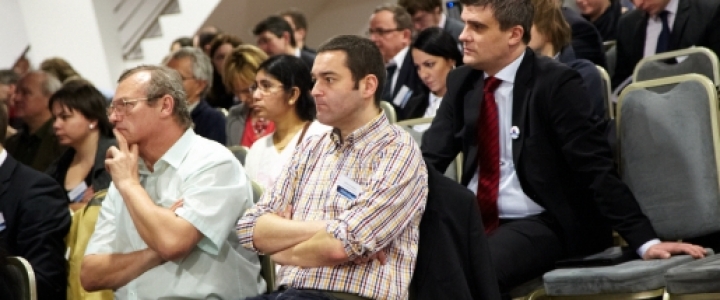
On April 3rd, 2009 in Bôrik Hotel, Bratislava, the conference “Knowledge Society in Practice: HI-TECH SLOVAKIA“ was held under the auspices of the Deputy Prime Minister of the Government of the Slovak Republic, Minister of Education, Mr Ján Mikolaj and of the Deputy Prime Minister of the Government of the Slovak Republic for knowledge-based society, European affairs, human rights and minorities, Mr Dušan Čaplovič.
The conference was organized by the Slovak Organization for R&D Activities (SOVVA) with the goal to draw attention to a new way of looking at the role of R&D in society, to explain the main role of structural funds in the area of R&D funding in Slovakia and to confront it with the expectation of the main players of Slovak science and to demonstrate, using specific foreign examples, how significantly a combination of activities in making new discoveries, education and structural funds can accelerate regional development.
The conference was open by Mr. Maroš Šefčovič, Ambassador Extraordinary and Plenipotentiary of the Slovak Republic to the European Union introducing the political section. Mr. Janez Potočnik, European Commissioner for Science and Research gave a key speech titled “Building Knowledge Society in Slovakia as Seen by the European Commission: How to Maximize the Effect of Using EU and Domestic Resources“. In his speech, Deputy Prime Minister of the Government of the Slovak Republic for knowledge society, European affairs, human rights and minorities, Mr. Dušan Čaplovič, pointed to the role of science and technology in the context of building a knowledge-based society, and Mr. Jozef Habánik, State Secretary of the Ministry of Education of the Slovak Republic, commented on the priorities of the resort in the area of funding research and development in the year 2009. The opening block was concluded by Mr. Jakub Dürr, Deputy Minister of Education of the Czech Republic, who elaborated on the priorities of the Lisbon strategy.
- The thematic block focused on regional development with emphasis on S&T parks and innovation clusters was opened by Ms Katarína Mathernová, Deputy Director-General of the Directorate-General for Regional Policy of the European Commission. In a reflection on the opportunities and threats of the process of the economic and social development of Slovakia, Ms Mathernová warned about ineffective scattering of resources from the structural funds which have been attributed to Slovakia for strategic investments in R&D. Ms Anneliese Stoklaska, representative of the Federal Ministry for Science and Research of Austria gave a speech on interregional cooperation regarding innovations. Mr. Bengt Streijffert, CEO at Øresund Science Region, shared his experience from establishing the cross-border science cooperation. Principles of the operation of the TURKU science park were explained by its vice-president, Mr. Tapani Saarinen. Mr. Stanislav Kmeť, vice-rector of the Technical University in Košice shared the experience from establishing the university S&T Park ‘Košice IT Valley’. Mr Štefan Chudoba contributed experience from building the Automotive Cluster Western Slovakia.
- Mr. Iain C Shirlaw, president of the Scottish company Active Investment Partners compared the transfer of academic knowledge into industrial practice to the transformation from caterpillar to butterfly. Mr. Robert Redhammer, vice-rector for science and research of the Slovak University of Technology in Bratislava reflected on the obstacles to the transfer of science outputs into practice. The background and functioning of the Finnish research centre VTT were presented by its president Mr. Erkki KM Leppävuori, who claimed that the reason Finland ranks among world leaders in R&D is that it has been continuously and effectively investing almost 3.5% GDP in these activities. Mr. Daniel Kaminský, chair of the supervisory board of Ostrava S&T park shared examples of best practice which have helped the park thrive for 12 years already.
- Mr. Stanislav Sipko of the Slovak Organization for R&D Activities (SOVVA) opened the third block of the conference with an analysis of the possibilities of fostering top research via centers of excellence. He confirmed the statements of the previous speakers, saying that it is not the legal form that is most important, but the way of orienting, financing and doing research. Mr. Jaromír Pastorek, president of the Slovak Academy of Sciences, considers international cooperation of utmost importance. Publishing articles in reviewed magazines guarantees Slovak research a good reputation abroad as well as new future opportunities. Yet another example of best practice was given in the speech of Mr. František Uherek, deputy director of the International Laser Centre in Bratislava, which ranks among the best research centers in Slovakia. An example of managing technological centers of excellence in Austria was presented by Mr Otto Starzer, head of the program group ‘Competence and Excellence’ of the Austrian Research Promotion Agency.
- Mr. Otakar Fojt, science attaché of the British Embassy in Prague opened the last block by a call for science to engage more in popularizing itself among the youth. Mr. Richard Imrich, director of the Center for Molecular Medicine of the Slovak Academy of Sciences, compared two models of mobility of researchers – that, which is used in most European countries, which moves in the direction academic environment – research centers/industrial practice and vice versa, to the ‘Slovak model’ which represents a one-way movement from universities to the private sector or abroad, the so-called ‘brain drain’. A possible solution to problems presented by the first two speakers was presented by Mr. Fritz Ohler, Managing Director of Technopolis Group Austria.
- Mr. Ivo Vondrák, Dean of the Faculty of Electrical Engineering and Computer Science of the Technical University in Ostrava, Czech Republic, shared the experience he had gained in an excellent research center abroad and attempted to apply it to the conditions of his home university.
The conference was supplemented by the Funds for science market, which provided the participants with more information on acquiring financial support from a variety of sources.
The presentations of individual speakers can be downloaded here.




